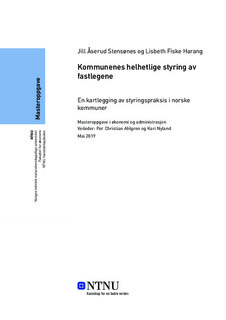| dc.contributor.advisor | Ahlgren, Per Christian | |
| dc.contributor.advisor | Nyland, Kari | |
| dc.contributor.author | Stensønes, Jill Åserud | |
| dc.contributor.author | Harang, Lisbeth Fiske | |
| dc.date.accessioned | 2019-09-17T14:00:49Z | |
| dc.date.available | 2019-09-17T14:00:49Z | |
| dc.date.issued | 2019 | |
| dc.identifier.uri | http://hdl.handle.net/11250/2617277 | |
| dc.description.abstract | Flere hevder at fastlegeordningen er i krise. Siden innføringen i 2001, har betingelsene rundt fastlegeordningen endret seg. Fastleger rapporterer om økt arbeidsbelastning og økte forventninger. En konsekvens av dette er svikt i rekrutteringen av fastleger i tillegg til at allerede praktiserende fastleger slutter. Med en aldrende befolkning blir det viktig å ha en fungerende og robust fastlegeordning. Det er kommunenes ansvar å sørge for god kvalitet på legetjenesten, og sikre tilgjengelig fastlege for alle som oppholder seg i kommunen. Formålet med denne studien er å kartlegge kommunenes styring av fastlegene, og hva som kjennetegner deres økonomistyringssystem. Vår tilnærming til økonomistyring er en bred forståelse som inkluderer formelle og uformelle mekanismer. Oppgaven ønsker å gi bedre innsikt i hvordan kommunene forvalter sitt sørge-for-ansvar gjennom følgende problemstilling:
"Hvordan styrer kommunene fastlegene?"
For å svare på denne problemstillingen ble det gjennomført en landsdekkende spørreundersøkelse som ble sendt ut til helseledere og kommuneoverleger. Spørreskjemaet var egenutviklet og delvis inspirert av tidligere rapporter. Totalt deltok 167 helseledere og 174 kommuneoverleger, som tilsvarer en svarprosent på 44,4 \%. Dataen ble behandlet i SPSS og analysert ved bruk av deskriptiv statistikk, hovedsakelig frekvenstabeller og krysstabulering.
Resultatene tyder på at kommunene styrer mer enn de tror og tidligere antatt av andre rapporter. Vår undersøkelse indikerer at regelstyring, i form av lover og forskrifter, sammen med tillit er fundamentet for kommunenes styring av fastlegene. Funnene viser også at dialog av formell og uformell karakter ansees som viktig. Profesjonens ønske om autonomi i arbeidet blir mulig gjennom høy tillit og overordnet regelstyring. Implikasjoner er at utviklingen på dette området bør ha fokus på de uformelle styringsmekanismene. Opplevd målkongruens mellom kommunene og fastlegene tyder på at fastlegene bør behandles som en steward, ikke som en agent, siden økt overvåkning i et slikt forhold kan føre til opportunistiske handlinger. | |
| dc.description.abstract | There have been claims that the General Phsycian (GP) scheme in Norway is in crisis. Since its introduction in 2001 the conditions of the scheme has changed. Physicians are reporting that they face an increased work load and increased expectations. As a consequence of this there is a decline in recruitment as well as an increase in the resignations of existing physicians. Faced with an aging population, a functioning and robust GP scheme will be important. Securing the quality of the GP scheme is the responsibility of the municipalities, in addition to securing access to physicians for all inhabitants of the municipality. The purpose of this study is to map how the municipalities control the GPs, and the aspects of their management control system (MCS). Our approach to management control is a broad understanding which includes formal and informal mechanisms. This study's goal is to provide better insights into how the municipalities administer their ensurance-responsibility using the following topic question:
"How do the municipalities control the GPs?"
In order to answer this topic question a nationwide survey was sent out to health managers and chief attending physicians of the municipalities. The survey was self-developed as well as partly inspired by former reports. A total of 167 health managers and 174 chief attending physicians participated in the study, resulting in a participation percentage of 44.4 \%. The empiricial material was processed in SPSS and analysed using descriptive statistics, mainly frequency tables and cross-tabulation.
The results indicate that the municipalities use more control than they think and more than has been assumed by former reports. Our research indicates that action control is paramount in the MCS package of the municipalities. Rules lay the foundation in the form of laws and regulations giving the GPs national guidelines to follow, thus defining their room for maneuvering. The findings further indicate that the MCS is characterized by high relationship trust and that formal and informal dialog is considered important. This trust allows the GPs a lot of autonomy in their work, which is important for strong professions. The implication is that the focus in this area should be on the informal control mechanisms. The experienced goal congruence between the municpalities and the GPs suggests that the GPs should be treated as a steward, not as an agent, since increased monitoring in such a relationship can lead to opportunistic actions. | |
| dc.language | nob | |
| dc.publisher | NTNU | |
| dc.title | Kommunenes helhetlige styring av fastlegene - En kartlegging av styringspraksis i norske kommuner | |
| dc.type | Master thesis | |
